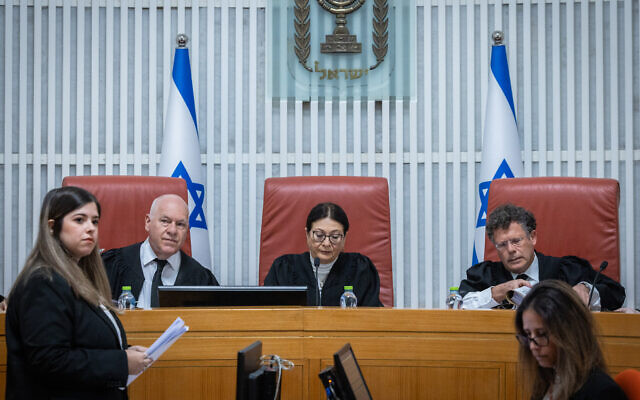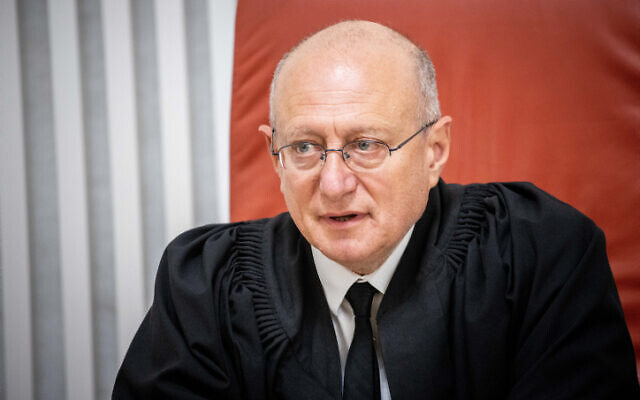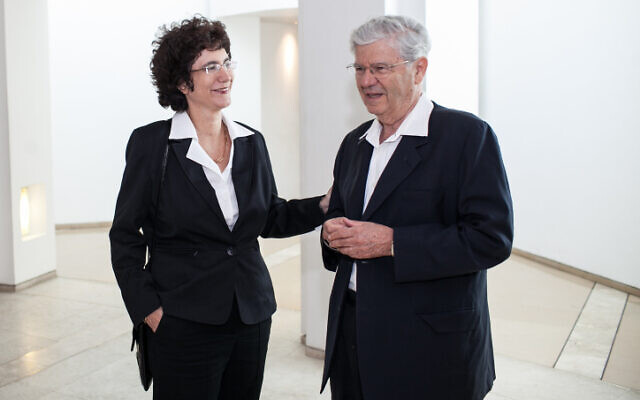“We all bow our heads to the law, but the law bows its head to no one,” Justice Alex Stein of the high court wrote at the end of his strongly written opinion on Wednesday. Desk, Government That Shas leader Arye Deri cannot serve as a minister in the government.
The line was the culmination of Stein’s determination that in 2022 Derry had given the Jerusalem magistrate’s court the false impression that he intended to leave political life, preventing him from holding ministerial office again.
Indeed, this reasoning, based on the doctrine of judicial restraint, is an important aspect of the ruling, and was applied by Stein, along with four other justices.
Although most of the justices ruled that Derry’s appointment was invalid because of the principle of reasonableness, the use of the restriction by five of them takes on special significance in light of the government’s stated intention to revoke the court’s ability to use “reasonableness”. . Principles in the evaluation of decisions and appointments of the Government.
In anticipation of a decision based on reasonableness, the Coalition was planning to swiftly pass legislation to repeal the doctrine’s use and then reappoint Derry, thus forcing the High Court to re-appoint him. Invalidation prevented.
Because estoppel had also been invoked, reinstatement of Derry as minister would now be much more difficult.

Supreme Court President Esther Hayat and other justices during a hearing of High Court justices on petitions against the appointment of Shas Party leader Arya Deri as a minister due to her recent conviction for tax crimes, Jan. 2023. (Jonathan Sindel/Flash90) )
But what exactly is the ban, and how does it affect Derry’s hiring more broadly?
Judicial Clause (E) word is derived from the verb “estop”) is a legal principle whereby a person may not take a position in a legal proceeding that runs contrary to a position taken in a separate legal proceeding, and benefit from both outcomes.
In other words, the High Court judges ruled that Derry’s commitment to withdraw from public life a year earlier in the Jerusalem magistrate’s court was binding, and so he could not benefit from the generous plea bargaining he had obtained from that court. In direct violation of that assumption, the misconception he gave, and also held ministerial office.
What the court was saying through its use of the injunction is that Derry should never have accepted his appointment as Minister of the Interior and Health, and should never have offered it to Prime Minister Benjamin Netanyahu, because Derry told the Jerusalem Magistrate’s Court at a hearing in 2022, before he was sentenced for tax crimes, that he was leaving the Knesset to obtain a plea bargain.
At that hearing, Derry’s lawyer also said that “the public statement of the accused and his retirement from political life” showed that he was “speaking from the heart”, while the judge then said that Derry had “found himself to deal with the exigencies”. was turning away from “the public,” a comment which Derry did not dispute.
In his ruling, Stein summarized the principle neatly, quoting a decision by the US Seventh Circuit Court of Appeals, in which the judge wrote, “The crime is not taking an inconsistent position because it is winning, two Inconsistent position depending on the bar.

Supreme Court Justice Alex Stein during a hearing of an appeal for the release of Roman Zadorov at the Supreme Court in Jerusalem on August 20, 2021. (Jonathan Sindel/Flash90)
The mechanism by which Derry is prevented from being appointed a minister is somewhat vague compared to the rationale, which, in the case of the governing leader, simply stipulates that Derry’s 2022 conviction for tax fraud and that offense His suspended prison sentence, running alongside his 1999 conviction for bribery, makes his appointment as a government minister, as High Court President Esther Hyatt said, “extremely inappropriate.”
Stein, in his opinion, states that the principles of judicial restraint not only prevent a person from adopting contradictory positions in legal proceedings, but are also relevant to “require the application of provisions of law by governmental authority”. Appointment of Minister of Government.
Five of the panel’s eleven justices invoked the doctrine of estoppel to invalidate Derry’s appointment, while seven ruled that the principle of “reasonableness” disqualified him, two of whom also claimed estoppel. .
But although only a minority of the panel called for a ban, even in the unlikely event that the government revoked the court’s ability to use the doctrine of reasonableness and then reinstated him as a minister , several other justices are expected to join their colleagues in claiming the injunction. Was the matter returned to court, and would prevent Derry from returning to government again.
Furthermore, the use of estoppel creates further barriers to restoring dairy.
In theory, the government could amend the basic law: the judiciary, to prevent the court from ruling on political appointees. But it would be a drastic step that would remove any constraints on the government in political appointments, no matter how unfair, and would also harness further political capital to enact.

Prime Minister Benjamin Netanyahu embraces Interior and Health Minister Aryeh Deri during the swearing-in ceremony of the new government in the Knesset on December 29, 2022. (Yonatan Sindel/Flash90)
Making Derry an alternate prime minister is another option, but this requires the government itself to be dissolved, and then a new government established based on the complex framework required for an alternate prime minister.
Even in such a case, the estoppel doctrine may still prevent Derry from taking that position.
In a political career that has been famous, or perhaps infamous, for many schemes, intrigues and political maneuvering, it is striking that a doctrine such as estoppel could be what prevents Derry from ever serving in high office again.
Several justices have noted in their judgments the moral and ethical imperative that the doctrine seeks to uphold, and the vital importance of upholding the rule of law.
Justice Daphne Barak-Arrez wrote that the doctrine of estoppel was designed to “preserve the purity of legal process”.

Supreme Court Justice Daphne Barak-Arez speaks with former Supreme Court President Aharon Barak at the swearing-in ceremony of new justices on May 31, 2012. (Noam Moskowitz/Flash90)
and Stein argued that preventing the governing leader from office was a moral necessity for the rule of law and for the virtue of integrity to the law in the face of Derry’s various legal and political triads.
“it [Deri’s] The appointment grossly violates his stated commitment, and we cannot allow this. The doctrine of judicial restraint … is designed to protect the integrity of the judicial system,” Stein said.
“Being elected to the Knesset and his promotion to a high office of government does not confer on that person special rights, does not absolve him from his legal obligations and does not confer immunity from the consequences of legal, criminal or civil proceedings,” concluded justice.
“In our legal regime, which has inscribed on its banner the principle of the rule of law, everyone is equal before the law. People of high rank are not above the law, and ordinary citizens are not below it. They bow their heads, but the law does not bow its head before anyone.